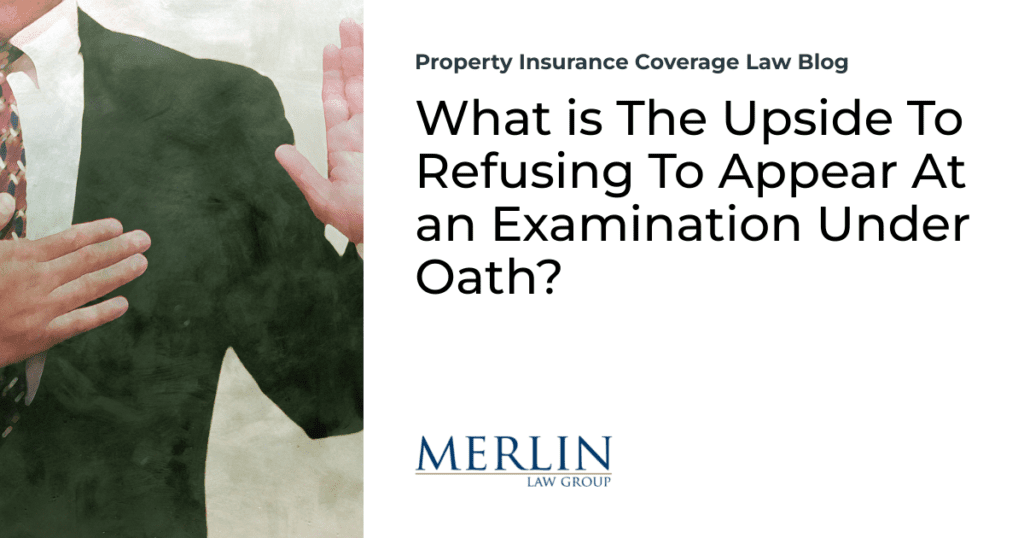What is The Upside To Refusing To Appear At an Examination Under Oath?

The title of this post is what I thought while reading a motion for summary judgment filed last week in a pending Arizona case in which our firm has no involvement. Unless the policyholder may have criminal implications arise as a result of providing testimony, I would suggest there is no upside to refusing to go to a pre-suit demand for an examination under oath.
Perhaps the best way to look at this is first to see what the law says happens when a policyholder refuses to go to an examination under oath. The insurer noted Arizona law as follows:
In Warrilow v. Superior Court of State of Ariz. In and For Pima County, 142 Ariz. 250 (1984), the seminal case on this issue, the insured filed a claim for loss of firearms which was adjusted and paid. Shortly thereafter, the insured modified its firearms coverages and again claimed a theft loss to firearms. The insurer acknowledged receipt of the insured’s proof of loss but rejected it as insufficient for several reasons including because there was no documentation verifying the ownership or values of the items, and requested an EUO pursuant to the conditions in the insurance policy issued to the insured. he EUO was taken, but the insured refused to answer a number of questions. Counsel for the insurer advised the insured and his counsel that refusal to answer might be deemed a failure to cooperate which might cause the insurer to void its coverage. Id. Nothing further transpired on the claim until the insured filed suit. The insurer filed a motion for summary judgment on the grounds that the insured’s failure to answer questions at his EUO was a breach of his obligation to cooperate with the insurer which constituted a complete defense to his claim for coverage. The motion was denied, and the insurer appealed.
The appellate court held that an EUO condition is a standard provision in an insurance policy and that the law was ‘well settled; that a failure or refusal to comply will constitute a bar to any recovery against the insurer. The ‘only limitation’ the court noted, was that the ‘questions be material to the circumstances surrounding the insurer’s liability and the extent thereof.’ The court found that the information sought about the alleged theft of firearms, namely the number of guns the insured owned, whether or not he sold any guns he had purchased, and the source of his income, was clearly material to coverage under the policy in light of the express exclusion for coverage of property pertaining to the business of a gun dealer and the policy’s requirement that the insured provide satisfactory proof of interest in the property and its loss. The court referenced other case authority holding that a complete failure to appear for an EUO also bars recovery on a claim.
I will predict that the policyholder in this case will argue that the insurance company was not prejudiced because the insurer eventually took a deposition which is the same as an examination. The policyholder may also argue waiver.
But why did the policyholder have to make any argument on this issue? Why not go to the examination under oath and avoid the insurance company’s defense? Why put yourself in the position of losing on a technicality?
I am writing this because I routinely field questions asking if policyholders can refuse to go to an examination under oath or asking for reasons which can defeat the insurer’s demand. While policyholders may win the legal argument for avoidance, policyholders should not place themselves in that position if they can avoid it. Unless there are criminal implications by giving the testimony, it is an “everything to lose and nothing to be gained” from refusing to attend an examination under oath.
Thought For The Day
Some people don’t like change, but you need to embrace change if the alternative is disaster.
—Elon Musk



